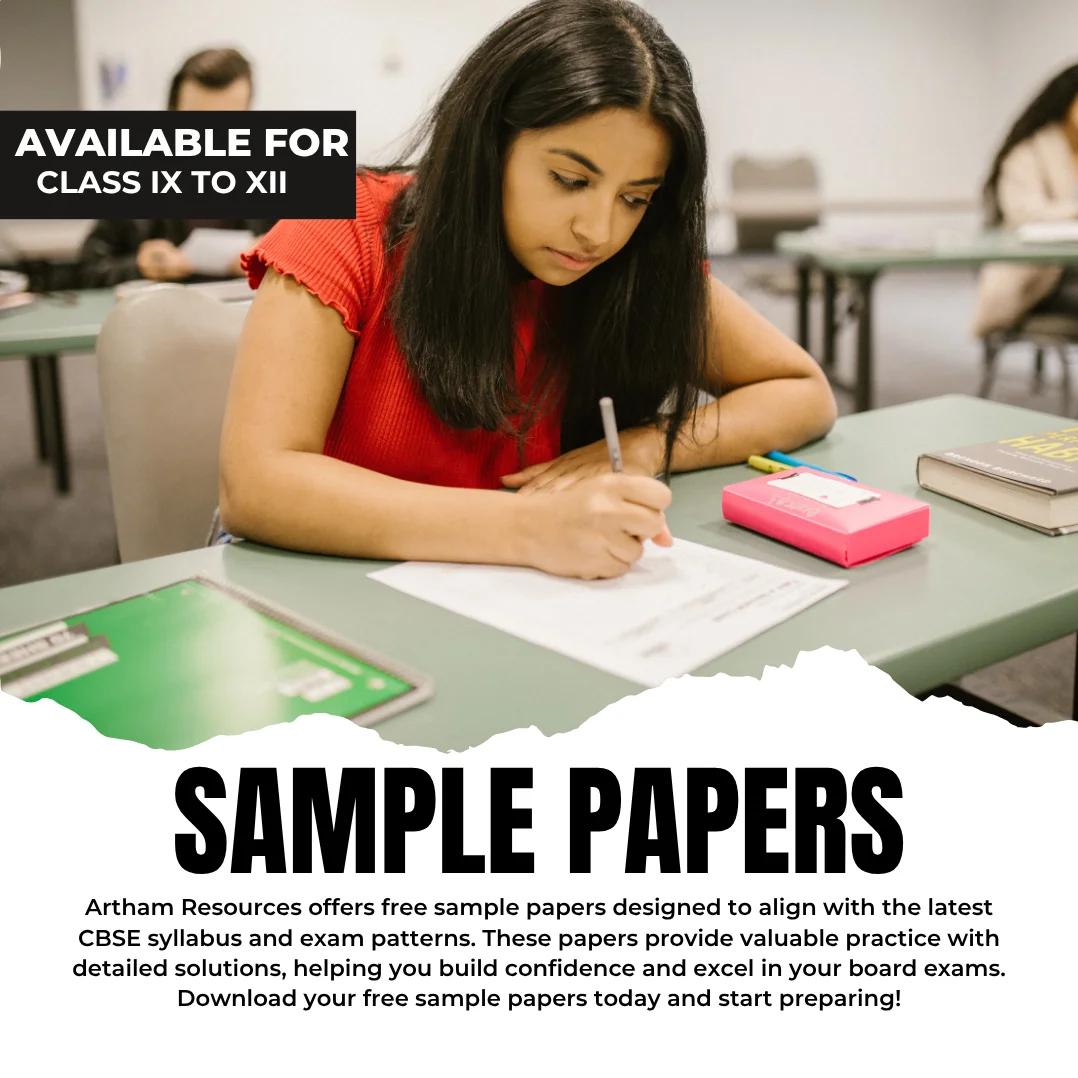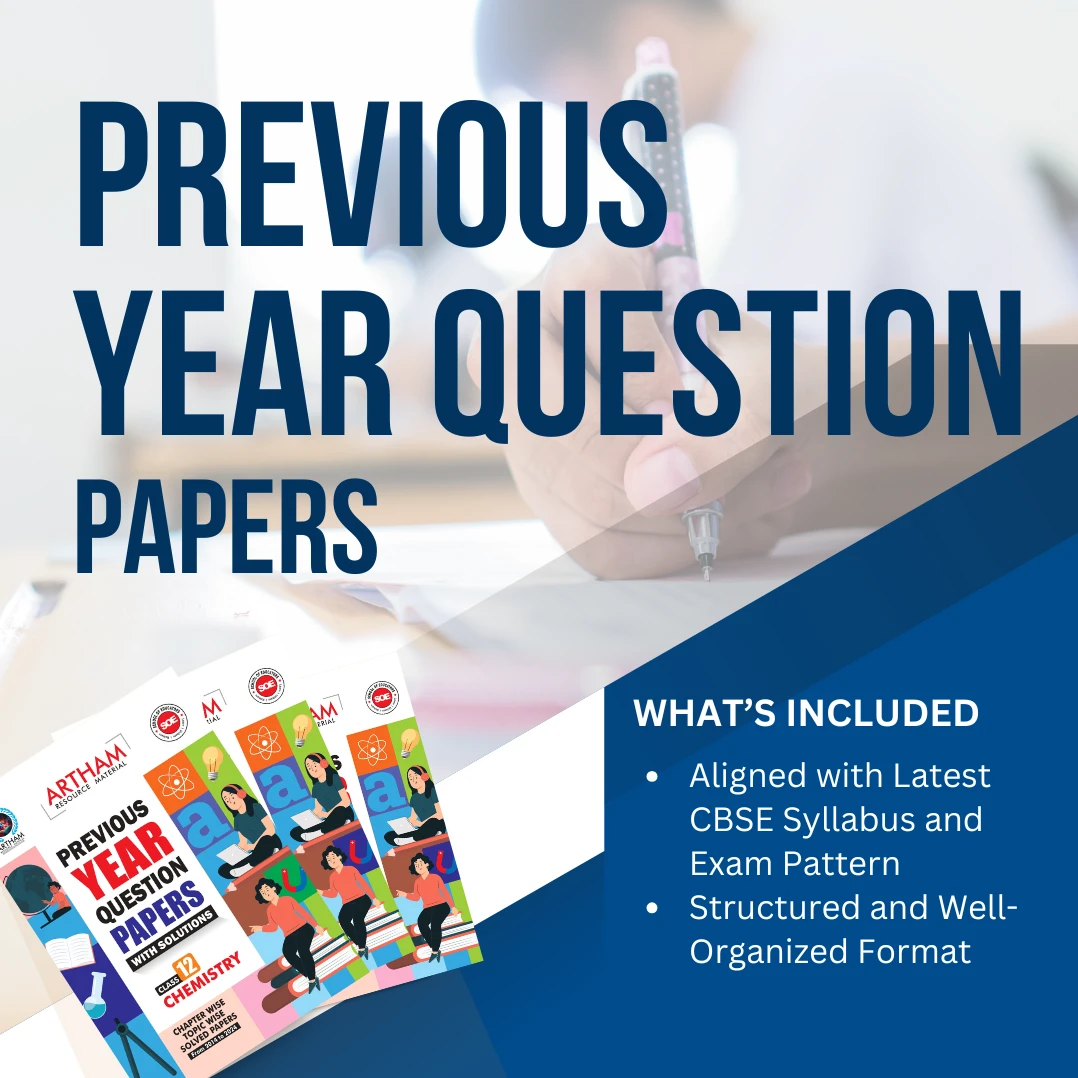Subtotal: ₹ 25.00
WhatsApp us at+91-95208-11111
Call Between 09:00 AM to 05:00PM (Monday to Saturday)
WhatsApp 24*7
Shopping Cart
Subtotal: ₹ 25.00
By Categories
- CBSE
- Chapter Wise Topic Wise Notes
- Chapter-Wise High-Probability Questions Booklet
- Competency-Based Question Bank
- Competitive Exams & Aptitude Tests
- Comprehensive Viva Voice
- Courses
- CUET
- Daily Practice Paper (DPP)
- Diagnostic Assessment
- eBooks
- Foundation and Olympiad Study Material
- Gift for Students
- Gift for Teachers
- Half Yearly Sample Question Paper with Solution
- Holiday Homework
- Illustrative Charts
- Journal
- Kindergarten
- Lesson Plan
- Life Skills
- Line by Line Questions
- Mind Maps
- Must Buy
- NCERT Exemplar Solutions
- NCERT Solutions
- Notes
- POWERPOINT PRESENTATIONS
- Pre Launch Stage
- Previous Year Question Papers
- Previous Year Question Papers with Solutions
- Print version of SOP
- Sample Paper
- Sample Paper with Solutions
- Self Development
- Split -up Syllabus
- Sports and Physical Education
- Standard Operating Manuals
- Study Materials for Students
- Teachers Manual with Lesson Plans
Price
Best seller
-
-100%
₹ 50.00Original price was: ₹ 50.00.₹ 0.00Current price is: ₹ 0.00. -
-100%
₹ 50.00Original price was: ₹ 50.00.₹ 0.00Current price is: ₹ 0.00. -
-100%
₹ 50.00Original price was: ₹ 50.00.₹ 0.00Current price is: ₹ 0.00. -
-100%
₹ 299.00Original price was: ₹ 299.00.₹ 0.00Current price is: ₹ 0.00.
Filter
Categories
- CBSE
- Chapter Wise Topic Wise Notes
- Chapter-Wise High-Probability Questions Booklet
- Competency-Based Question Bank
- Competitive Exams & Aptitude Tests
- Comprehensive Viva Voice
- Courses
- CUET
- Daily Practice Paper (DPP)
- Diagnostic Assessment
- eBooks
- Foundation and Olympiad Study Material
- Gift for Students
- Gift for Teachers
- Half Yearly Sample Question Paper with Solution
- Holiday Homework
- Illustrative Charts
- Journal
- Kindergarten
- Lesson Plan
- Life Skills
- Line by Line Questions
- Mind Maps
- Must Buy
- NCERT Exemplar Solutions
- NCERT Solutions
- Notes
- POWERPOINT PRESENTATIONS
- Pre Launch Stage
- Previous Year Question Papers
- Previous Year Question Papers with Solutions
- Print version of SOP
- Sample Paper
- Sample Paper with Solutions
- Self Development
- Split -up Syllabus
- Sports and Physical Education
- Standard Operating Manuals
- Study Materials for Students
- Teachers Manual with Lesson Plans
Price
Showing 1–16 of 18 results
-
-70%
Chapter Wise Topic Wise Lesson Plan Class 11 English (Prose) Chapter 2 We’re Not Afraid to Die... if We Can All Be Together
₹ 50.00Original price was: ₹ 50.00.₹ 15.00Current price is: ₹ 15.00.Chapter 2 of the Class 11 English Prose, “We’re Not Afraid to Die… if We Can All Be Together”, focuses on human resilience, courage, and the power of unity in the face of adversity. This lesson plan provides a detailed guide to teaching the chapter, incorporating key themes such as survival, family bonding, teamwork, and bravery.
Chapter 2 of the Class 11 English Prose, “We’re Not Afraid to Die… if We Can All Be Together”, focuses on human resilience, courage, and the power of unity in the face of adversity. This lesson plan provides a detailed guide to teaching the chapter, incorporating key themes such as survival, family bonding, teamwork, and bravery.
-
-70%
Chapter Wise Topic Wise Lesson Plan Class 10 English Chapter 5 Footprints without Feet
₹ 50.00Original price was: ₹ 50.00.₹ 15.00Current price is: ₹ 15.00.This lesson plan for Chapter 5, “Footprints without Feet,” is designed to help students explore the theme of invisibility and the consequences of scientific discoveries gone wrong. The story follows the intriguing journey of Griffin, a scientist who becomes invisible, leading to a series of misadventures.
This lesson plan for Chapter 5, “Footprints without Feet,” is designed to help students explore the theme of invisibility and the consequences of scientific discoveries gone wrong. The story follows the intriguing journey of Griffin, a scientist who becomes invisible, leading to a series of misadventures.
-
-70%
Chapter Wise Topic Wise Lesson Plan Class 10 English Chapter 2 The Thief’s Story
₹ 50.00Original price was: ₹ 50.00.₹ 15.00Current price is: ₹ 15.00.This lesson plan for Class 10 English focuses on Chapter 2, “The Thief’s Story,” a captivating tale of a young thief’s encounter with an older man who teaches him valuable life lessons. The chapter revolves around themes of crime, self-realization, and transformation.
This lesson plan for Class 10 English focuses on Chapter 2, “The Thief’s Story,” a captivating tale of a young thief’s encounter with an older man who teaches him valuable life lessons. The chapter revolves around themes of crime, self-realization, and transformation.
-
-50%
Chapter Wise Topic Wise Lesson Plan Class 9 English Chapter 7 The Last Leaf
₹ 50.00Original price was: ₹ 50.00.₹ 25.00Current price is: ₹ 25.00.Chapter 7 of Class 9 English, “The Last Leaf,” by O. Henry, presents a poignant tale about hope, sacrifice, and the power of friendship. This lesson plan aims to guide students through the themes and characters of the story while enhancing their reading and comprehension skills. The plan includes pre-reading activities to activate prior knowledge, followed by guided reading sessions that focus on understanding the plot, character development, and thematic elements.
Chapter 7 of Class 9 English, “The Last Leaf,” by O. Henry, presents a poignant tale about hope, sacrifice, and the power of friendship. This lesson plan aims to guide students through the themes and characters of the story while enhancing their reading and comprehension skills. The plan includes pre-reading activities to activate prior knowledge, followed by guided reading sessions that focus on understanding the plot, character development, and thematic elements.
-
-50%
Chapter Wise Topic Wise Lesson Plan Class 9 English Chapter 4 In the Kingdom of Fools
₹ 50.00Original price was: ₹ 50.00.₹ 25.00Current price is: ₹ 25.00.This lesson plan for Class 9 English, Chapter 4: “In the Kingdom of Fools,” provides an engaging, topic-wise guide to understanding this thought-provoking story by A.K. Ramanujan. The lesson begins with an introduction to the story’s themes, including justice, wisdom, and folly, and examines the absurdity and humor woven throughout.
This lesson plan for Class 9 English, Chapter 4: “In the Kingdom of Fools,” provides an engaging, topic-wise guide to understanding this thought-provoking story by A.K. Ramanujan. The lesson begins with an introduction to the story’s themes, including justice, wisdom, and folly, and examines the absurdity and humor woven throughout.
-
-50%
Chapter Wise Topic Wise Lesson Plan Class 9 English Chapter 1 The Lost Child
₹ 50.00Original price was: ₹ 50.00.₹ 25.00Current price is: ₹ 25.00.The lesson plan for Class 9 English Chapter 1, The Lost Child, offers a structured approach to understanding the emotional depth and moral lessons embedded in the story. This chapter explores the themes of childhood innocence, materialism, and the bond between a child and his parents. The lesson begins with a detailed introduction to the story’s characters and setting, followed by a breakdown of key events, their significance, and character motivations.
The lesson plan for Class 9 English Chapter 1, The Lost Child, offers a structured approach to understanding the emotional depth and moral lessons embedded in the story. This chapter explores the themes of childhood innocence, materialism, and the bond between a child and his parents. The lesson begins with a detailed introduction to the story’s characters and setting, followed by a breakdown of key events, their significance, and character motivations.
-
-50%
Chapter Wise Topic Wise Lesson Plan Class 9 English Chapter 5 A Legend of the Northland
₹ 50.00Original price was: ₹ 50.00.₹ 25.00Current price is: ₹ 25.00.This lesson plan for Class 9 English focuses on Chapter 5, “A Legend of the Northland,” a poem by Phoebe Cary. The plan is structured to guide students through the themes, poetic devices, and moral lessons embedded in the poem. The chapter discusses the tale of a woman who, out of greed, is punished by being transformed into a bird, a story that explores themes like selfishness, divine justice, and compassion.
This lesson plan for Class 9 English focuses on Chapter 5, “A Legend of the Northland,” a poem by Phoebe Cary. The plan is structured to guide students through the themes, poetic devices, and moral lessons embedded in the poem. The chapter discusses the tale of a woman who, out of greed, is punished by being transformed into a bird, a story that explores themes like selfishness, divine justice, and compassion.
-
-70%
Chapter Wise Topic Wise Lesson Plan Class 12 English (Prose) Chapter 4 The Rattrap
₹ 50.00Original price was: ₹ 50.00.₹ 15.00Current price is: ₹ 15.00.The lesson plan for Chapter 4, “The Rattrap,” from Class 12 English (Prose), offers an in-depth analysis of the short story by Selma Lagerlöf. The story revolves around a peddler who, despite his dismal circumstances, views the world as a rattrap, luring people with its materialistic offerings. The lesson plan outlines the story’s key themes of redemption, compassion, and human dignity.
The lesson plan for Chapter 4, “The Rattrap,” from Class 12 English (Prose), offers an in-depth analysis of the short story by Selma Lagerlöf. The story revolves around a peddler who, despite his dismal circumstances, views the world as a rattrap, luring people with its materialistic offerings. The lesson plan outlines the story’s key themes of redemption, compassion, and human dignity.
-
-50%
Chapter Wise Topic Wise Notes Class 12 English (Prose) Chapter 4 The Rattrap
₹ 50.00Original price was: ₹ 50.00.₹ 25.00Current price is: ₹ 25.00.Chapter 4 of the Class 12 English (Prose) syllabus, “The Rattrap” by Selma Lagerlöf, explores themes of human nature, deception, and redemption. This chapter follows the story of a peddler who is trapped in the metaphorical sense, symbolized by the rattrap. As he wanders through the woods, he experiences an epiphany about his life and the choices he has made.
Chapter 4 of the Class 12 English (Prose) syllabus, “The Rattrap” by Selma Lagerlöf, explores themes of human nature, deception, and redemption. This chapter follows the story of a peddler who is trapped in the metaphorical sense, symbolized by the rattrap. As he wanders through the woods, he experiences an epiphany about his life and the choices he has made.
-
-62%
Lesson Plan Class 8 English Chapter 1 The Best Christmas Present in the World
₹ 50.00Original price was: ₹ 50.00.₹ 19.00Current price is: ₹ 19.00.This lesson plan for Class 8 English, focusing on Chapter 1 “The Best Christmas Present in the World,” immerses students in a heartwarming narrative that explores themes of compassion, history, and the human spirit. The lesson begins with an introduction to the author and historical context, followed by a deep dive into comprehension and analysis of the text’s characters, setting, and plot. Activities include interactive reading sessions, group discussions on moral lessons, and creative exercises such as writing letters from characters’ perspectives.
This lesson plan for Class 8 English, focusing on Chapter 1 “The Best Christmas Present in the World,” immerses students in a heartwarming narrative that explores themes of compassion, history, and the human spirit. The lesson begins with an introduction to the author and historical context, followed by a deep dive into comprehension and analysis of the text’s characters, setting, and plot. Activities include interactive reading sessions, group discussions on moral lessons, and creative exercises such as writing letters from characters’ perspectives.
-
-50%
Lesson Plan Class 7 English Chapter 3 Golu Grows a Nose
₹ 50.00Original price was: ₹ 50.00.₹ 25.00Current price is: ₹ 25.00.This lesson plan for Class 7 English focuses on Chapter 3 from the textbook titled “Golu Grows a Nose.” The lesson is designed to explore themes of self-acceptance and empathy through the story of Golu, a character who discovers the importance of individuality. Students will engage in activities that encourage critical thinking and creativity, such as group discussions on the moral implications of the story, role-playing exercises to understand different perspectives, and writing prompts to reflect on personal growth and acceptance.
This lesson plan for Class 7 English focuses on Chapter 3 from the textbook titled “Golu Grows a Nose.” The lesson is designed to explore themes of self-acceptance and empathy through the story of Golu, a character who discovers the importance of individuality. Students will engage in activities that encourage critical thinking and creativity, such as group discussions on the moral implications of the story, role-playing exercises to understand different perspectives, and writing prompts to reflect on personal growth and acceptance.
-
-50%
Lesson Plan Class 7 English Chapter 1 Three Questions
₹ 50.00Original price was: ₹ 50.00.₹ 25.00Current price is: ₹ 25.00.The “Lesson Plan for Class 7 English Chapter 1: Three Questions” provides a comprehensive guide for educators to teach Leo Tolstoy’s thought-provoking story. This lesson plan outlines engaging activities, discussion questions, and interactive tasks to help students explore the central themes of wisdom, kindness, and the pursuit of knowledge. It includes a detailed breakdown of the lesson objectives, key vocabulary, and step-by-step instructions for facilitating class discussions and group work.
The “Lesson Plan for Class 7 English Chapter 1: Three Questions” provides a comprehensive guide for educators to teach Leo Tolstoy’s thought-provoking story. This lesson plan outlines engaging activities, discussion questions, and interactive tasks to help students explore the central themes of wisdom, kindness, and the pursuit of knowledge. It includes a detailed breakdown of the lesson objectives, key vocabulary, and step-by-step instructions for facilitating class discussions and group work.
-
-50%
Hindi Notes Class VIII हिन्दी (Vasant) Chapter 10 अकबरी लोटा
₹ 50.00Original price was: ₹ 50.00.₹ 25.00Current price is: ₹ 25.00.यह हिंदी नोट्स कक्षा VIII के हिन्दी पाठ्यपुस्तक के अध्याय 10, “अकबरी लोटा” के मुख्य विषयों को समझाने के लिए तैयार किए गए हैं। यह छात्रों के लिए कहानी के महत्व और संदेश को स्पष्ट करने में सहायक हैं।
Book Type: eBook/pdf (Will be Delivered on email after order)
यह हिंदी नोट्स कक्षा VIII के हिन्दी पाठ्यपुस्तक के अध्याय 10, “अकबरी लोटा” के मुख्य विषयों को समझाने के लिए तैयार किए गए हैं। यह छात्रों के लिए कहानी के महत्व और संदेश को स्पष्ट करने में सहायक हैं।
Book Type: eBook/pdf (Will be Delivered on email after order)
-
-50%
Notes Class VI English Chapter 3 The Shepherd’s Treasure
₹ 50.00Original price was: ₹ 50.00.₹ 25.00Current price is: ₹ 25.00.Artham Resources presents detailed and engaging notes for Class VI English Chapter 3: The Shepherd’s Treasure. These notes are designed to help students comprehend the moral and key themes of the story while enhancing their language skills.
Book Type: eBook/pdf (Will be delivered on email after order)
Artham Resources presents detailed and engaging notes for Class VI English Chapter 3: The Shepherd’s Treasure. These notes are designed to help students comprehend the moral and key themes of the story while enhancing their language skills.
Book Type: eBook/pdf (Will be delivered on email after order)
-
-50%
Notes Class VI English Chapter 1 A Tale of Two Birds
₹ 50.00Original price was: ₹ 50.00.₹ 25.00Current price is: ₹ 25.00.Artham Resources presents detailed notes for Class VI English Chapter 1: A Tale of Two Birds. These notes are designed to enhance students’ comprehension, vocabulary, and critical thinking skills, while also engaging them with the story’s moral values and themes.
Book Type: eBook/pdf (Will be delivered on email after order)
Artham Resources presents detailed notes for Class VI English Chapter 1: A Tale of Two Birds. These notes are designed to enhance students’ comprehension, vocabulary, and critical thinking skills, while also engaging them with the story’s moral values and themes.
Book Type: eBook/pdf (Will be delivered on email after order)
-
-50%
Notes Class VII English Chapter 5 The Bear Story
₹ 50.00Original price was: ₹ 50.00.₹ 25.00Current price is: ₹ 25.00.Artham Resources presents insightful notes for Class VII English Chapter 5: “The Bear Story,” focusing on the moral lessons conveyed through an engaging narrative.
Click here to Download Sample Notes
Book Type: eBook/pdf (Will be delivered on email after order)
Artham Resources presents insightful notes for Class VII English Chapter 5: “The Bear Story,” focusing on the moral lessons conveyed through an engaging narrative.
Click here to Download Sample Notes
Book Type: eBook/pdf (Will be delivered on email after order)
Teaching is one of the hardest and most important jobs in the world. We provide the support that teachers need to transform their subjects into terms that their students will understand.
Important Links
USEFUL LINKS
Contact Us
- Nageen International
- B-162, 4th Floor, DDA Shed, Okhla Industrial Area Phase 1 New Delhi-110020 (India)
- WhatsApp us at +91-95208-11111
- Email: info@educatorsresource.in
- (Monday to Saturday) WhatsApp 24*7
2025 Educator Resources. All Rights Reserved.






